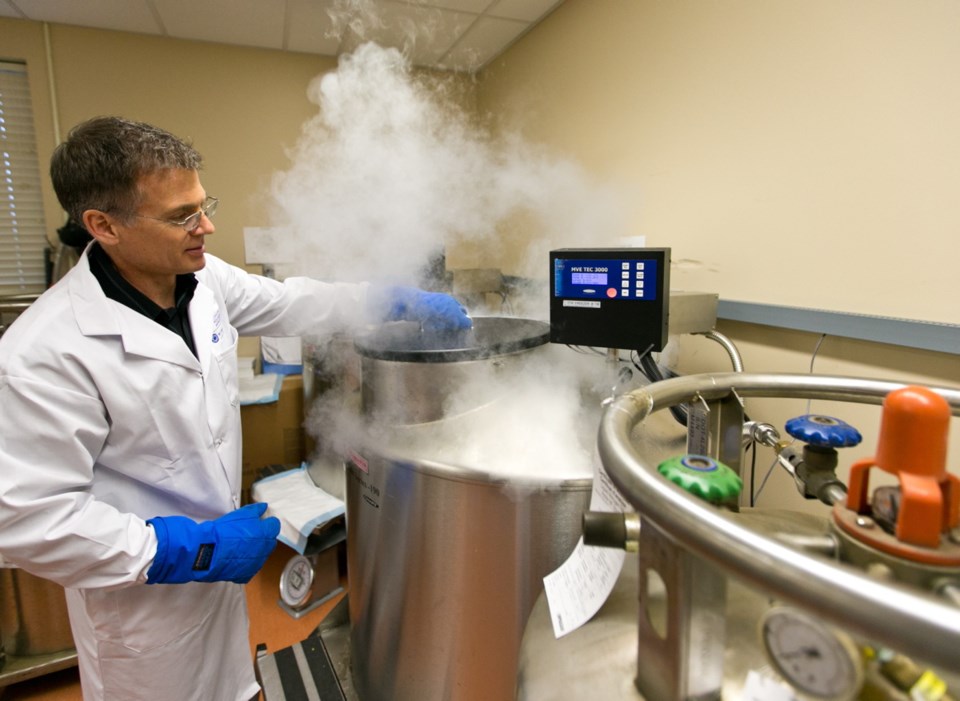Groundbreaking personalized cancer-fighting treatment, including some world firsts, is expected to go to clinical trials in Victoria within a year.
In a “clean room” at the B.C. Cancer Agency in Victoria, scientists will extract immune cells — T cells — from people with incurable cancers, reinvigorate and multiply those cells, and re-inject them into the patient’s bloodstream to seek out and destroy cancer cells wherever they might be hiding.
The trials, expected to start in early 2017, are the culmination of 12 years of work by Dr. Brad Nelson and others at the B.C. Cancer Agency.
“Victoria will be the second in the country to have any sort of T cell therapy program and the trials we will do will be first in the world,” Nelson said.
“In the end, we are just trying to help patients, so what excites me every day is just thinking there will be patients for whom, unfortunately, their cancer has come back and chemotherapy is no longer helping them but we’ll be able to say there is a new trial that’s just opening — T cell therapy — and they would be eligible for it if interested.”
Nelson and his group have been growing T cells for a decade. With the completion next month of a clean room — which meets strict Health Canada standards for sterility levels, staffing, quality assurance and control measures — they will be able to grow T cells that can be used in patients.
The team will extract T cells from patients with incurable ovarian and cervical cancers.
The cells will be activated and expanded in massive numbers, then shipped frozen to Vancouver General Hospital, where they will be injected back into patients.
Victoria will be just one of five centres in the world trying to treat ovarian and cervical cancers this way.
Nelson’s work falls under the umbrella of immunotherapy, what he calls one of the hottest areas of oncology right now. It refers to a variety of emerging treatments that engage and fortify a patient’s immune system to fight disease.
One of the most promising is antibody-based drugs or biologics called “immune modulators” injected into the bloodstream to stimulate the immune system.
Nelson recently met a B.C. man whose body was covered in advanced deadly melanoma lesions that disappeared over the past year as part of a clinical trial.
“It’s miraculous when it works, and that miracle, that kind of complete response, happens about a quarter of the time with patients,” he said.
Several of the drugs used in clinical trials now have U.S. Food and Drug Administration approval and the same drugs are showing efficacy in about 10 kinds of cancer, including lung cancer, Hodgkin’s lymphoma, cervical cancer and bladder cancer.
These clinical trials are taking place in centres around the world and Victoria’s B.C. Cancer Agency participates in that work.
When Nelson produces T cells in a way that has not been done before — using immune modulators in conjunction with T cell therapy — that would be a “first in the world,” he said.
“It will be a double whammy against the tumour.”
That’s only the beginning. T cells will be manipulated to track cancer, and engineered, and there’s a separate clinical trial that will be done on lymphoma.
Clinical trials are also underway in Vancouver, where the sequencing of genomes is allowing oncologists to tailor pharmaceutical drugs to a patient’s unique cancer.
Alone, the two clinical trials in Victoria and Vancouver are touted as the “next generation.”
Together, they are a potential powerhouse of highly customized treatments likely to replace chemotherapy and see radiation become ever more precise.



